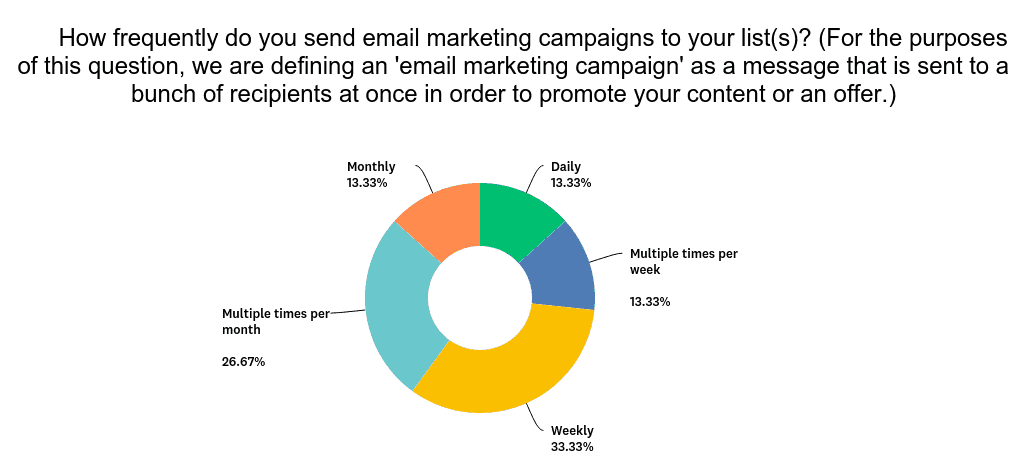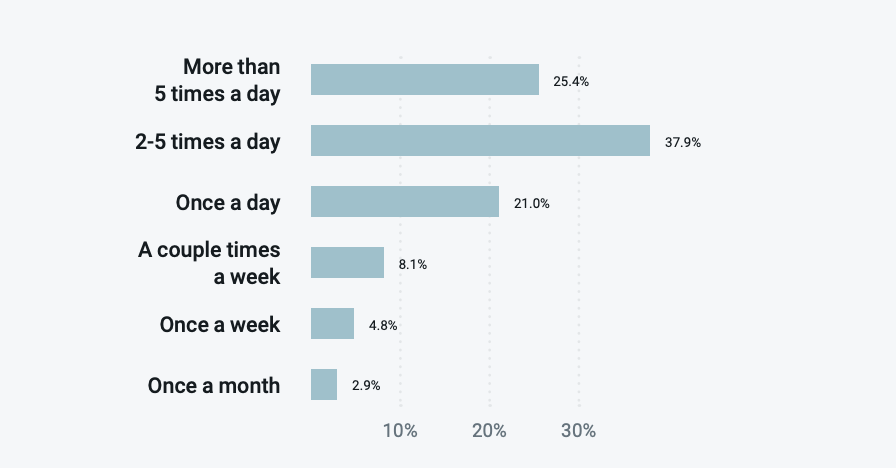The Ultimate List of Email Marketing Stats for 2022
- July 11, 2022
- Knowledge Base
- 0 Comments

Webinars, video campaigns, and social media posts are relatively new channels for marketers to reach their customers. But, your contemporary communication methods shouldn’t distract you from one of the oldest, yet most effective, strategies — email marketing. In fact, email ROI is an impressive $36 for every $1 spent.
If you’re still hesitant, keep reading — we’ve cultivated a list of email marketing statistics for HubSpot to demonstrate just how powerful email can be. Here, you’ll find:
Email Marketing Stats (Highlights)
- There are 4 billion daily email users.
- 37% of brands are increasing their email budget.
- A majority of marketers using email leverage mobile-friendly emails as part of their marketing strategy.
- Subscriber segmentation is the most effective email marketing campaign strategy.
- 33% of marketers send weekly emails and 26% send emails multiple times per month.
- 77% of marketers have seen an increase in email engagement over the last 12 months.
- Smartphone users prefer to receive brand communications via email.
- Almost half of marketers report changing their email performance measurements as a result of Apple’s Mail Privacy Protection changes.
- Testing your emails leads to higher ROI.
General Email Marketing Statistics and Best Practices
- Email marketing is used by 1 in 2 media planners. It will continue to grow this year with 22% planning to leverage it for the first time.(HubSpot Blog Research, 2021)
- Email marketing revenue is estimated to reach almost 11 billion by the end of 2023. (Statista, 2021)
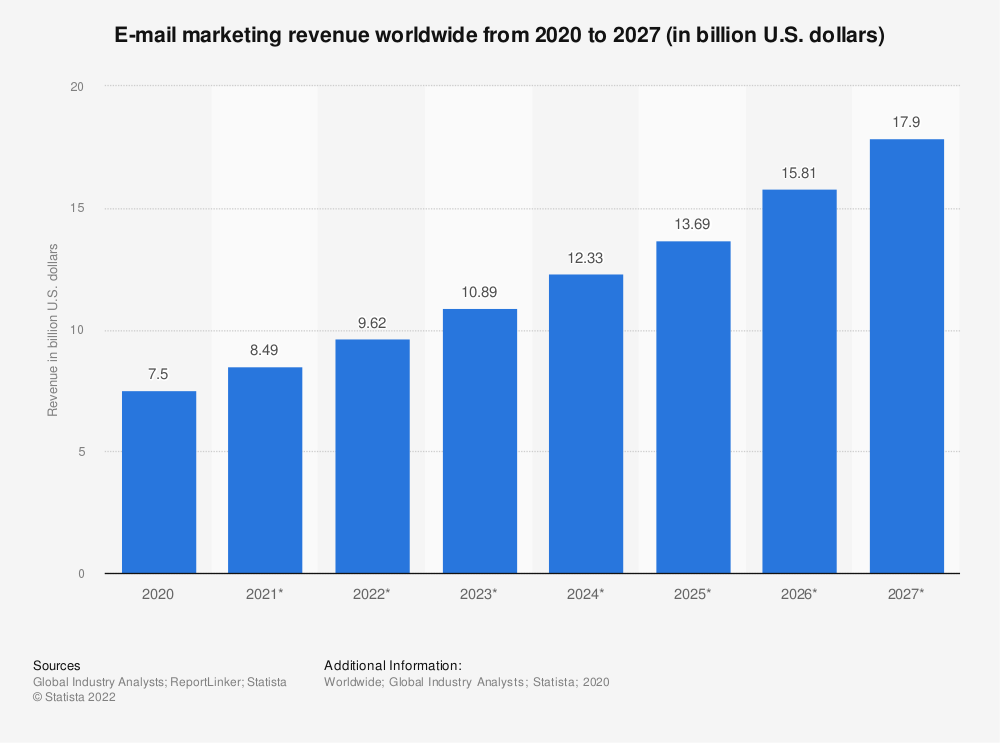
- There are 4 billion daily email users. This number is expected to climb to 4.6 billion by 2025. (Statista, 2021)
- More than 306 billion emails are sent and received each day. (Statista, 2021)
- 64% of small businesses use email marketing to reach customers. (Campaign Monitor, 2021)
- 37% of brands are increasing their email budget, and just 1.3% are making cuts. (Litmus, 2021)
- The most effective strategies for email marketing campaigns are subscriber segmentation (78%), message personalization (72%), and email automation campaigns (71%). (HubSpot Blog Research, 2021)
- 33% of marketers send weekly emails and 26% send emails multiple times per month. (Databox, 2022)
- 63% of businesses reduce the frequency of emails send to subscribers based on their levels of engagement. (Databox, 2022)
- 41.5% of brands say that email marketing is very critical to business success, compared to 78% in 2020. (Litmus, 2021)
- 77% of marketers have seen an increase in email engagement over the last 12 months. (Not Another State of Marketing, 2021)
- Globally, Fridays see the highest email open rates (nearly 19%), compared to the lowest open rates (17%) on Saturdays. (Campaign Monitor, 2021)
- 43% of marketers are changing how they measure email performance because of Apple’s Mail Privacy Protection, and 24% aren’t making any changes for now. (Litmus, 2021)
- The most significant way that email marketers adapted to recent data privacy changes was by prioritizing different KPIs. (HubSpot Blog Research, 2021)
- The most effective email subject lines engage curiosity, include promotional offers, and are personalized to each recipient’s interests. (HubSpot Blog Research, 2021)
-
QA, A/B, and spam testing your emails leads to higher ROI. Enjoy up to a 28% higher return when you put testing to work for your email program. (Litmus, 2022)
B2B Email Marketing Statistics
- 81% of B2B marketers say their most used form of content marketing is email newsletters. (Content Marketing Institute, 2020)
-
64% of B2B marketers say their email marketing strategy was effective for meeting business goals in 2021. (HubSpot Blog Research, 2021)
- 15.8% of all emails go missing or have been caught by popular spam filters. (Email Tool Tester, 2022)
- B2B marketers say that new product and feature announcement marketing emails have the highest click-through rate. (HubSpot Blog Research, 2021)
- Automation is primarily used in email marketing to send triggered emails, for drip or nurture campaigns, and segmentation. (Litmus, 2021)
Mobile Marketing Statistics
- A majority of email views come from mobile devices (41%), followed by desktop (39%). (HubSpot Blog Research, 2021)
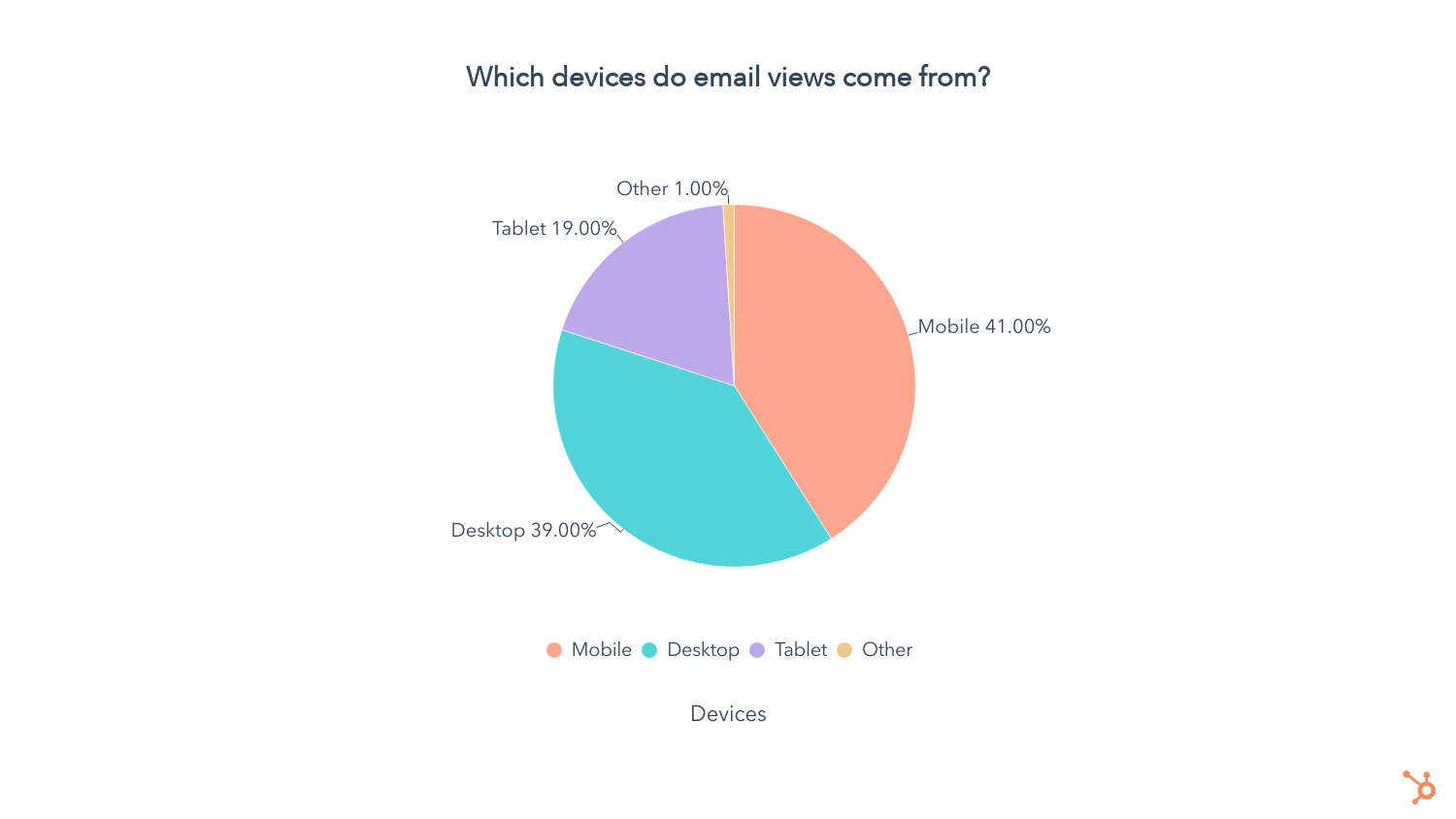
- Nearly 55% of global website traffic is generated from mobile devices, excluding tablets. (Statista, 2022)
- 46% of smartphone users prefer to receive communications from businesses via email. (Statista, 2021)
- Apple iPhone’s native email app has the highest market share, followed by Gmail. (Litmus Labs, 2022)
- Nearly 1 in 5 email campaigns is not optimized for mobile devices. (SuperOffice, 2020)
- Launching a mobile-responsive email design can increase unique mobile clicks by 15%. (MailChimp, 2021)
- 56% of marketers leverage mobile-friendly emails in their email marketing strategy. (HubSpot Blog Research, 2021)
B2C Email Marketing Statistics
Email Marketing Demographics 2021
- 99% of email users check their inbox every day, with some checking 20 times a day. Of those people, 58% of consumers check their email first thing in the morning. (OptinMonster, 2020) 84.3% of consumers say they check their emails at least once a day. (Pathwire, 2021)
- 35% of survey respondents in the U.S. have two email addresses and 28% have over four. (Statista, 2021)
- Consumers spend an average of 10 seconds reading brand emails. (Statista, 2021)
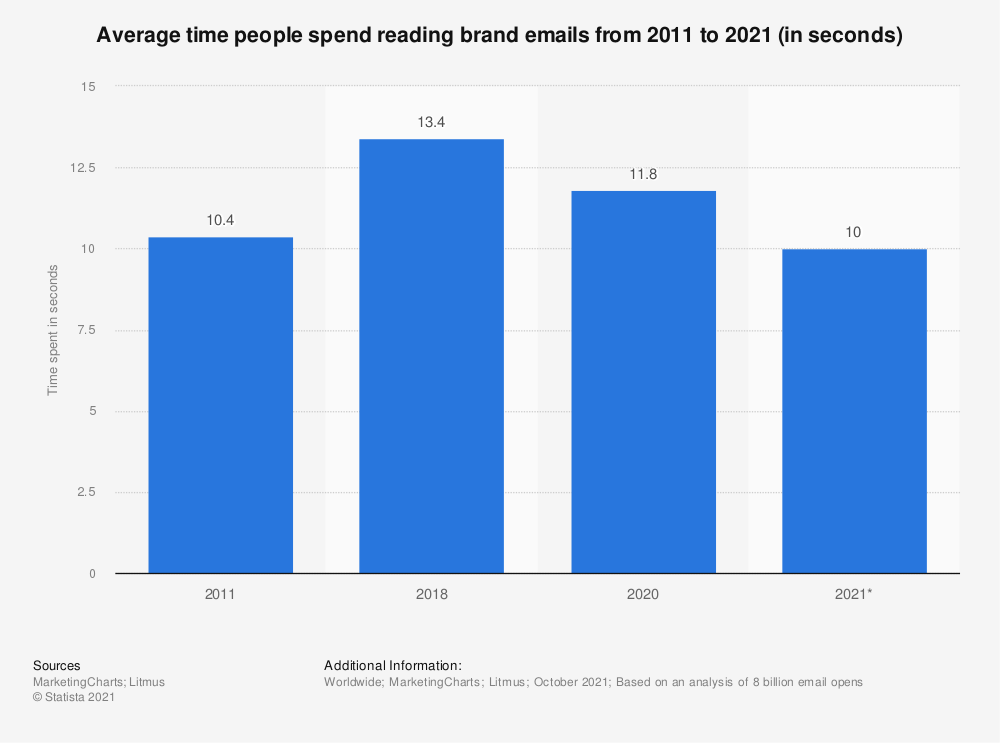
- 40% of consumers say they have at least 50 unread emails in their inbox. (HubSpot, 2020)
- Email is the leading way consumers in the U.S. discover coupons from brands. (Statista, 2021)
- Recognizing a sender is the most important factor in deciding to open an email, followed by actually having the time to read an email. (Pathwire, 2021)
- The average bounce rate across all industries is 9.96%.
(Constant Contact, 2022) - 59% of Millennials primarily use their smartphone to check email, while 67% of Generation Z scans their inbox on mobile. (Bluecore, 2021)
- 74% of Baby Boomers think email is the most personal channel to receive communications from brands, followed by 72% of Gen X, 64% of Millennials, and 60% of Gen Z. (Bluecore, 2021)
- The most significant steps marketers take to champion accessibility when creating their emails is writing short, descriptive subject lines, making links and buttons easy to see, and keeping paragraphs short and simple. (Pathwire, 2021)
Apply Your Email Knowledge
Many of the data points will help you make the case for investing more time and money into your email marketing strategy. While you can refer back to this post at any time, you can also start applying them to your next campaign.
Editor’s Note: This blog post was originally published in March 2019, but was updated for comprehensiveness and freshness.

